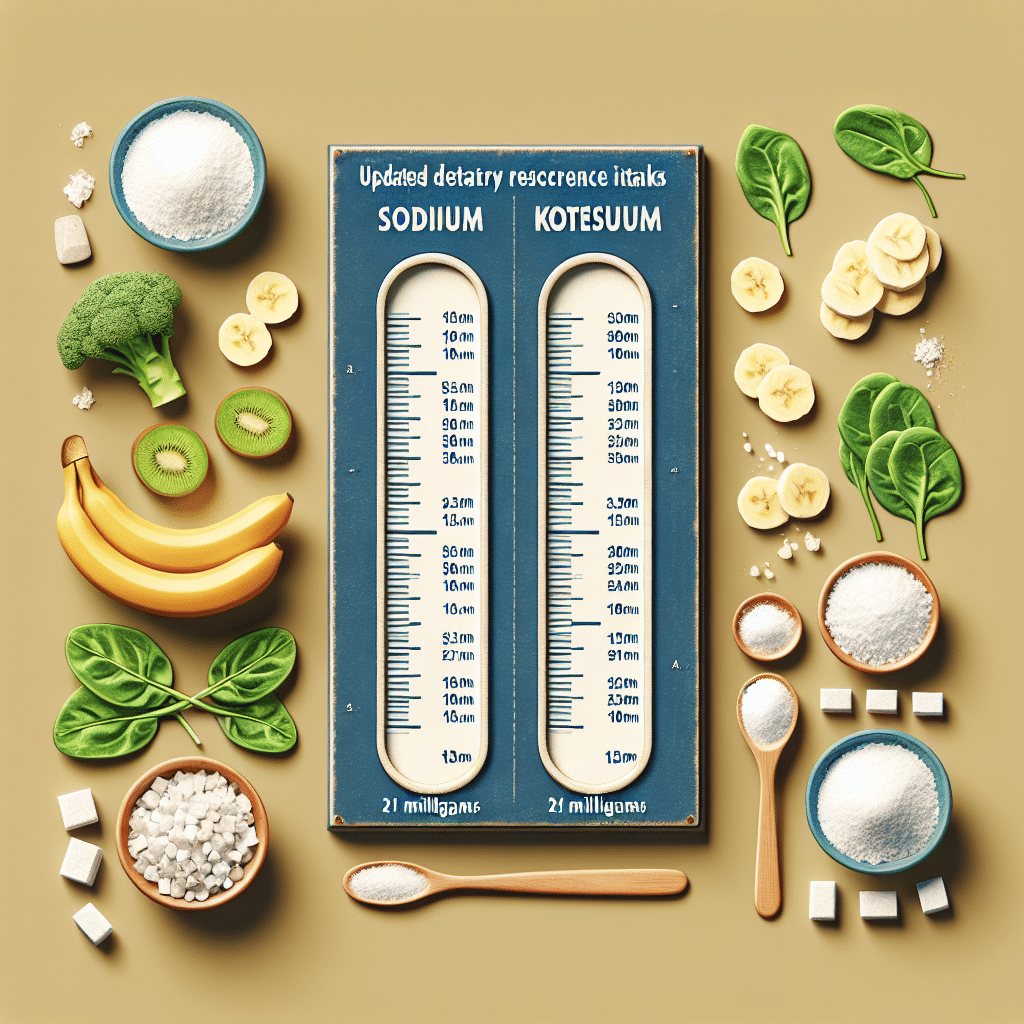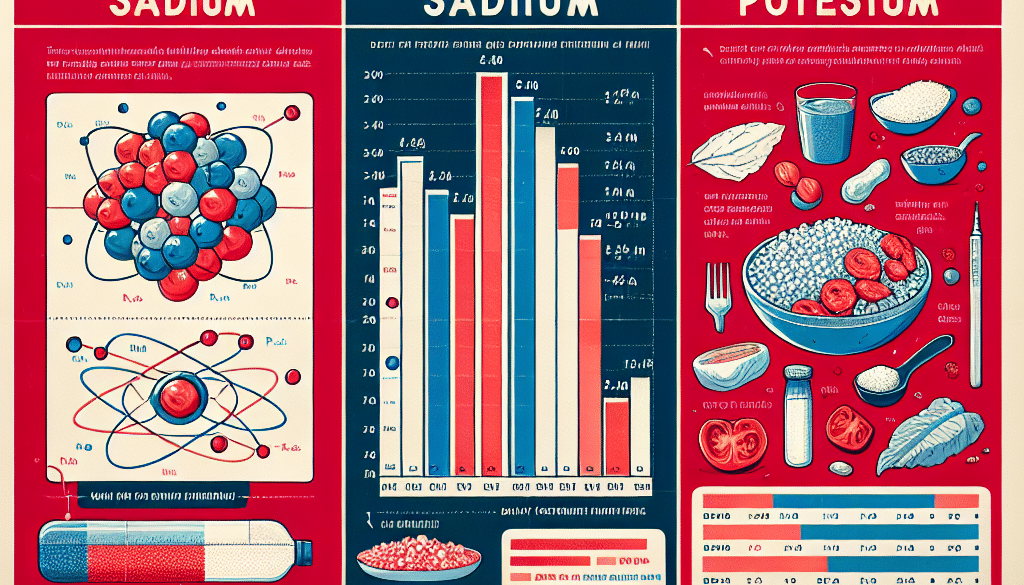Updated Dietary Reference Intakes for Sodium and Potassium
-
Table of Contents
- Understanding the Updated Dietary Reference Intakes for Sodium and Potassium
- The Importance of Sodium and Potassium in the Diet
- Updated Dietary Reference Intakes: What’s New?
- Implications for Public Health
- Strategies for Achieving the Updated DRIs
- Case Studies and Statistics
- Conclusion: Key Takeaways on Sodium and Potassium Intake
- Enhance Your Diet with ETprotein’s High-Quality Protein Products
Understanding the Updated Dietary Reference Intakes for Sodium and Potassium

The human body requires a delicate balance of nutrients to function optimally, and among these, sodium and potassium play critical roles. Recent updates to the Dietary Reference Intakes (DRIs) for these essential minerals reflect the latest scientific evidence on their impact on health. This article delves into the significance of these updates, their implications for public health, and how individuals can adjust their diets accordingly.
The Importance of Sodium and Potassium in the Diet
Sodium and potassium are electrolytes that are vital for maintaining fluid balance, supporting nerve function, and regulating muscle contractions, including the heartbeat. While sodium is often associated with negative health outcomes when consumed in excess, potassium is generally recognized for its protective effects against hypertension and cardiovascular disease.
Updated Dietary Reference Intakes: What’s New?
The National Academies of Sciences, Engineering, and Medicine periodically review and update the DRIs based on emerging scientific evidence. The latest updates for sodium and potassium reflect a comprehensive analysis of how these nutrients affect health outcomes.
- Sodium: The updated DRIs for sodium emphasize the importance of reducing intake to lower the risk of chronic diseases, particularly hypertension and cardiovascular disease. The new guidelines suggest an Adequate Intake (AI) level that varies by age, sex, and life stage, with a general recommendation for adults to consume no more than 2,300 milligrams per day.
- Potassium: For potassium, the DRIs have been adjusted to recommend higher intake levels that can counteract the negative effects of sodium and contribute to reduced blood pressure and decreased risk of kidney stones and bone loss. The AI for potassium also varies, with adult recommendations set at 2,600 milligrams per day for women and 3,400 milligrams per day for men.
Implications for Public Health
The updated DRIs for sodium and potassium have significant implications for public health. High sodium consumption is a widespread issue, with most people exceeding the recommended limits, largely due to processed and restaurant foods. Conversely, potassium intake is often below the recommended levels, partly because of low consumption of fruits, vegetables, and other potassium-rich foods.
Strategies for Achieving the Updated DRIs
Meeting the updated DRIs for sodium and potassium requires a concerted effort to modify dietary habits. Here are some strategies to help achieve these goals:
- Read Nutrition Labels: Pay attention to the sodium content in packaged foods and choose lower-sodium options.
- Increase Fruit and Vegetable Intake: Incorporate a variety of potassium-rich produce into your diet, such as leafy greens, bananas, oranges, and potatoes.
- Cook at Home: Preparing meals at home allows for better control over sodium content and the opportunity to use potassium-rich ingredients.
- Use Herbs and Spices: Flavor foods with herbs and spices instead of salt to reduce sodium intake while enhancing taste.
- Choose Unprocessed Foods: Opt for fresh or minimally processed foods, which are naturally lower in sodium and can be higher in potassium.
Case Studies and Statistics
Research has shown that populations with diets low in sodium and high in potassium have lower rates of hypertension and cardiovascular disease. For example, the DASH (Dietary Approaches to Stop Hypertension) diet, which emphasizes fruits, vegetables, and low-fat dairy products, has been successful in reducing blood pressure in clinical trials.
Statistics from the Centers for Disease Control and Prevention (CDC) indicate that the average American consumes more than 3,400 milligrams of sodium per day, well above the recommended limit. Conversely, less than 3% of Americans meet the recommended potassium intake. These figures highlight the need for dietary changes at the population level.
Conclusion: Key Takeaways on Sodium and Potassium Intake
The updated DRIs for sodium and potassium underscore the importance of these nutrients in maintaining health and preventing chronic diseases. Reducing sodium intake to within recommended limits and increasing potassium intake through a balanced diet can have profound health benefits. By making informed food choices and adopting healthier eating patterns, individuals can align their diets with the latest nutritional guidelines and support their overall well-being.
Enhance Your Diet with ETprotein’s High-Quality Protein Products
In addition to managing sodium and potassium intake, incorporating high-quality protein sources into your diet is essential for optimal health. ETprotein offers a range of organic bulk vegan proteins that can complement a balanced diet and support your nutritional goals. Their products, including organic rice protein, pea protein, and various seed proteins, are non-GMO, allergen-free, and characterized by a neutral taste, making them an excellent addition to any meal plan.
Whether you’re looking to improve your sports nutrition, manage your weight, or simply enhance your overall health and wellness, ETprotein’s protein offerings can provide the nutritional support you need. With their commitment to quality and purity, ETprotein is a trusted supplier for consumers seeking to improve their dietary intake with reliable protein sources.
About ETprotein:
ETprotein, a reputable protein and L-(+)-Ergothioneine (EGT) Chinese factory manufacturer and supplier, is renowned for producing, stocking, exporting, and delivering the highest quality organic bulk vegan proteins and L-(+)-Ergothioneine. They include Organic rice protein, clear rice protein, pea protein, clear pea protein, watermelon seed protein, pumpkin seed protein, sunflower seed protein, mung bean protein, peanut protein, and L-(+)-Ergothioneine EGT Pharmaceutical grade, L-(+)-Ergothioneine EGT food grade, L-(+)-Ergothioneine EGT cosmetic grade, L-(+)-Ergothioneine EGT reference grade and L-(+)-Ergothioneine EGT standard. Their offerings, characterized by a neutral taste, non-GMO, allergen-free attributes, with L-(+)-Ergothioneine purity over 98%, 99%, cater to a diverse range of industries. They serve nutraceutical, pharmaceutical, cosmeceutical, veterinary, as well as food and beverage finished product distributors, traders, and manufacturers across Europe, USA, Canada, Australia, Thailand, Japan, Korea, Brazil, and Chile, among others.
ETprotein specialization includes exporting and delivering tailor-made protein powder and finished nutritional supplements. Their extensive product range covers sectors like Food and Beverage, Sports Nutrition, Weight Management, Dietary Supplements, Health and Wellness Products, and Infant Formula, ensuring comprehensive solutions to meet all your protein needs.
As a trusted company by leading global food and beverage brands and Fortune 500 companies, ETprotein reinforces China’s reputation in the global arena. For more information or to sample their products, please contact them and email sales(at)ETprotein.com today.












